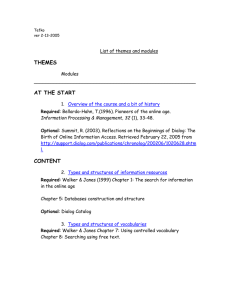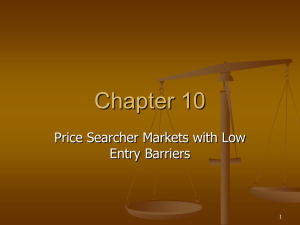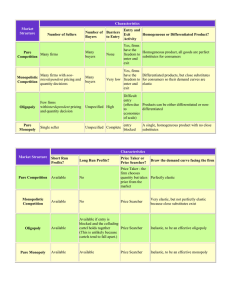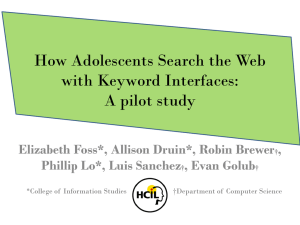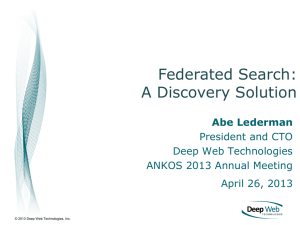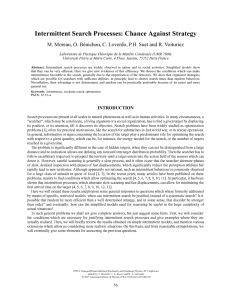module_reading_list_Yuelin_updated.doc
advertisement
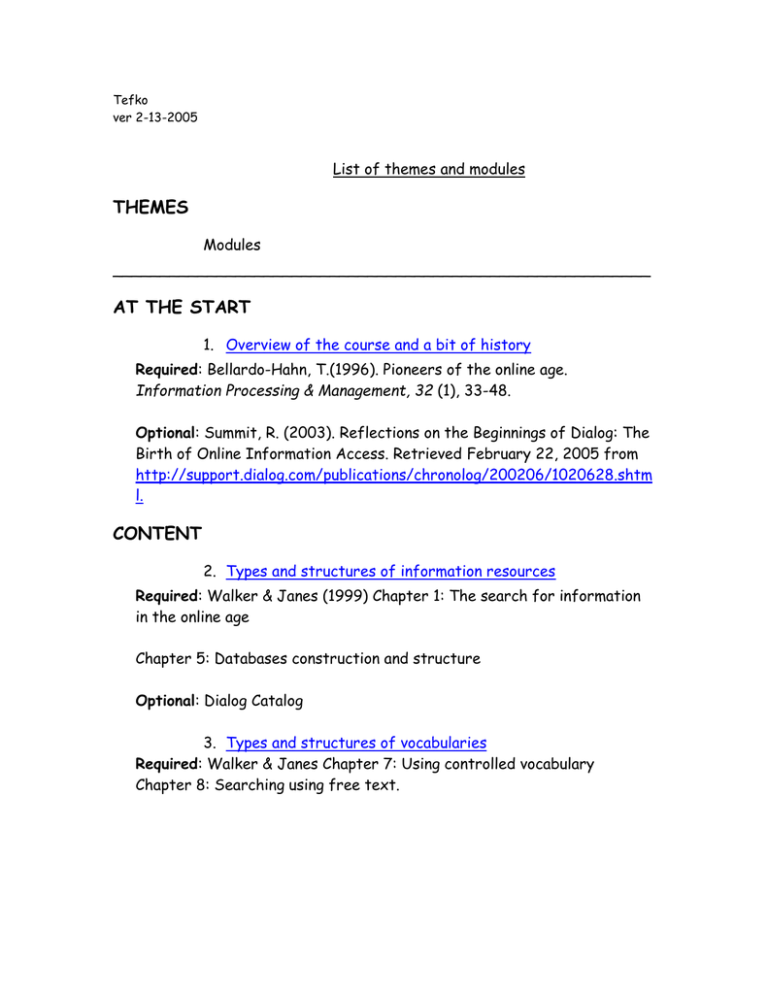
Tefko ver 2-13-2005 List of themes and modules THEMES Modules _________________________________________________________ AT THE START 1. Overview of the course and a bit of history Required: Bellardo-Hahn, T.(1996). Pioneers of the online age. Information Processing & Management, 32 (1), 33-48. Optional: Summit, R. (2003). Reflections on the Beginnings of Dialog: The Birth of Online Information Access. Retrieved February 22, 2005 from http://support.dialog.com/publications/chronolog/200206/1020628.shtm l. CONTENT 2. Types and structures of information resources Required: Walker & Janes (1999) Chapter 1: The search for information in the online age Chapter 5: Databases construction and structure Optional: Dialog Catalog 3. Types and structures of vocabularies Required: Walker & Janes Chapter 7: Using controlled vocabulary Chapter 8: Searching using free text. SYSTEMS 4. Information retrieval Required: Belew, R. K. (2000) Finding Out About: Search engine technology from a cognitive perspective. London: Cambridge University Press. Preface and Chapter 1. Overview. HTML version on author's site http://www.cs.ucsd.edu/~rik/foa/l2h . PDF version of Ch. 1. on author's site http://www.cs.ucsd.edu/~rik/foa/ Ratzan, L. (2004). Understanding information systems: what they do and why we need them. Chicago, IL: American Library Association. Chapter 4: Retrieving information. 5. Search engines Required: Hock R. (2004). The Extreme Searcher's Internet Handbook : A Guide for the Serious Searcher. Medford, NJ: CyberAge Books/Information Today. Chapter 2, 3, 4. Felter, L. M. (2005). Google Scholar, Scirus, and the Scholarly Search Revolution. Searcher, 13(2), 43-49. Gelernter, J. (2003). At the Limits of Google. Searcher, 11(1), 26-32. Optional: Price, G. D. (2002). Specialized Search Engine FAQs: More Questions, Answers, and Issues. Searcher, 10(9), 42-47. 6. Digital libraries HUMAN-COMPUTER INTERACTION 7. Search techniques and effectiveness Required: Walker & Janes Chapter 6: Search techniques Zins, C. (2000). Success, a structured search strategy: Ratinale, principles, and implications. Journal of the American Society for Information Science, 51 (13), 1232-1247. 8. Advanced search features Required: Walker and Janes (1999) Chapter 9 Additional search features 9. Web search and the invisible web Required: Hock R. (2004). The Extreme Searcher's Internet Handbook : A Guide for the Serious Searcher. Medford, NJ: CyberAge Books/Information Today. Chapter 1, 6, 7. Sherman, C., & Price, G. (2001). The Invisible Web: Uncovering Information Sources Search Engines Can't See. Medford, NJ: CyberAge Books. Chapter 1, 4, 6. HUMAN-HUMAN INTERACTION 10 Information seeking by users Required: Bates, M. (1989). The design of browsing and berrypicking techniques for the online search interface. Online Review, 13 (5), 407424. Kuhlthau, C. C. (1993). Seeking meaning: A process approach to library and information services. Norwood, NJ: Ablex Publishing Corporation. Reading: Ch. 3, pp. 33-51. Spink, A. (1997). Study of interactive feedback during mediated information retrieval. Journal of the American Society for Information Science, 48(5), 382-394. 11. Mediation and user modeling Required: Saracevic, T., Spink, A., & Wu, M.M. (1997). Users and intermediaries in interactive information retrieval (IR): what are they talking about? User Modeling. Proceedings of: the sixth international conference UM97(pp 43-54.). New York: Springer. Wu, M.-M., & Liu, Y.-H. (2003). Intermediary's information seeking, inquiring minds, and elicitation styles. Journal of the American Society for Information Science and Technology, 54(12), 1117-1133. RESULTS 12. Evaluation of search sources and results Required: Wathen, C. N.; Burkell, J. (2002). Believe it or not: factors influencing credibility on the Web. Journal of the American Society for Information Science and Technology, 53 (2), 134-44. McInerney, C. R. (2000). Establishing and maintaining trust in online systems. Proceedings of the Online 2000 Meeting, New York, May, 2000. http://scils.rutgers.edu/~clairemc/onlinepaper.htm 13. Presentation to users Required: Kassel, A. (2002). Value-added deliverables: Rungs on the info pro's ladder to success. Searcher: The Magazine for Database Professionals, 10 (10), 42-53. PROFESSIONAL CONCERNS 14. Ethics; competitive intelligence Required: Orick, J. T. (2000). The Virtual Library: Changing Roles and Ethical Challenges for Librarians. The International Information & Library Review, 32(3-4), 313-324. Koehler, W., J. Hurych, W. Dole and J. Wall. (2000). "Ethical Values of Information and Library Professionals: An Expanded Analysis." International Information and Library Review 32, 3 / 4: 485-506. Miller, J. P. (2000). Millennium intelligence: Understanding and conducting competitive intelligence in the digital age. Medford, NJ: CyberAge Books. Introduction and Chapter 1. 15. Keeping up: sources for life-time learning No readings suggested. AT THE END 16. Student presentations and conclusions
